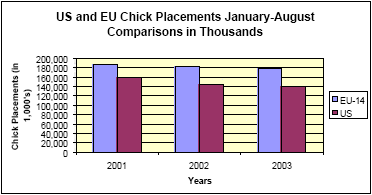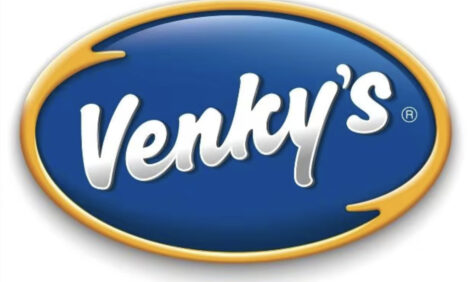



International Egg and Poultry Review
By the USDA's Agricultural Marketing Service - This is a weekly report looking at international developments concerning the poultry industry, this week looking at developments in the Avian Influenza outbreak.
European Community Program for Control of Salmonella
The EC has programs for the eradication and monitoring of certain animal diseases. These programs are financed under the Guarantee Section of the European Agricultural Guidance and Guarantee Fund.
On November 28, 2003 the Commission of the European Communities issued a Commission Decision which included the costs to control salmonella in breeding poultry. The programs presented for control of salmonella in breeding poultry were approved for calendar year 2004 for Austria, Denmark, France, Ireland, the Netherlands, Lithuania and Slovak.
Countries will be reimbursed 50 percent of the costs incurred by each country up to a maximum amount. The costs covered include destruction of incubated hatching eggs, breeding poultry and nonincubated hatching eggs. Breeding poultry and non-incubated hatching eggs may be sold if heat-treated and the difference in the value will be covered. The purchase of vaccines, with some limits and the cost of bacteriological tests performed as part of the official sampling, up to EUR 5 per test are covered.
| Country | Maximum Contribution for Reimbursement |
|
| Austria | EUR 150,000 | |
| Denmark | EUR 260,000 | |
| France | EUR 700,000 | |
| Ireland | EUR 90,000 | |
| the Netherlands | EUR 400,000 | |
| *Lithuania | EUR 400,000 | |
| *Slovak Republic | EUR 400,000 | |
| Financial commitments under the 2004 budget can’t be made before
the accession of acceding countries.
*Lithuania and Slovak are acceding countries Source: Official Journal of the European Union |
||
Avian Influenza Update:
The virus has spread at an incredible rate over the course of the past month hitting about ten countries in East Asia and killing 8 humans and tens of millions of fowl. As of January 27, it has claimed South Korea, Japan, Vietnam, Taiwan, Cambodia, Pakistan, Indonesia, Thailand, China, and Laos. Numerous other countries in the area are at risk and are taking aggressive precautions such as Australia and Singapore.
The WHO, United Nation's FAO, and the OIE have been called in to help contain the spread. The virus, which has already surpassed its' 1997 vaccine, has officials worried it could mutate and spread from human to human before a new vaccine can be produced, which is expected in the next 4 to 6 months. A conference has been scheduled for Wednesday January 28 in Bangkok, Thailand to address the avian flu from a global approach. The following ASEAN countries: Brunei, Cambodia, Indonesia, Laos, Malaysia, Myanmar, Philippines, Singapore, Thailand, Vietnam, China, South Korea, and Hong Kong will be in attendance.
The U.S., the world's largest chicken exporter, has begun filling Asia's supply gap as it's exports have begun to rise. A year ago the U.S. is estimated to have exported $2 billion worth of poultry and eggs, and stands to gain significantly this year in light of everything.
Source: Various News Wires
U.S. suppliers and products eligible under Iraq Oil-for-Food program
U.S. suppliers will be eligible to compete for new commodity contracts to feed Iraqi citizens under the Oil-for-Food Program.
In November, the Oil-for-Food Program was formally transferred from the United Nations to the Coalition Provisional Authority, which administers Iraq. The Coalition Provisional Authority requested that the World Food Program (WFP), the U.N.’s food aid agency, continue to manage the Oil-for-Food Program, under which food and humanitarian supplies are purchased, imported and distributed to Iraqi citizens.
Existing contracts developed before the war extend through June 2004, but WFP will soon issue new tenders to create a 60-day buffer stock of food. According to WFP, as much as $600 million may be allocated for new purchases, which are expected to include wheat, pulses, rice, vegetable oil and other commodities.
U.S. suppliers who are registered with WFP as official suppliers for international tenders will be eligible to compete for these contracts. Suppliers who are not registered with WFP can get registration instructions by contacting the WFP Food Procurement Service by e-mail at [email protected], or by telephone to Rome, Italy at +39-06-6513- 2993 or +39-06-6513-2547.
Source: http://www.fas.usda.gov/excredits/OilforFood121703.html

To view the full report, including tables please click here (PDF Format)
Source: USDA's Agricultural Marketing Service - 27th January 2004








